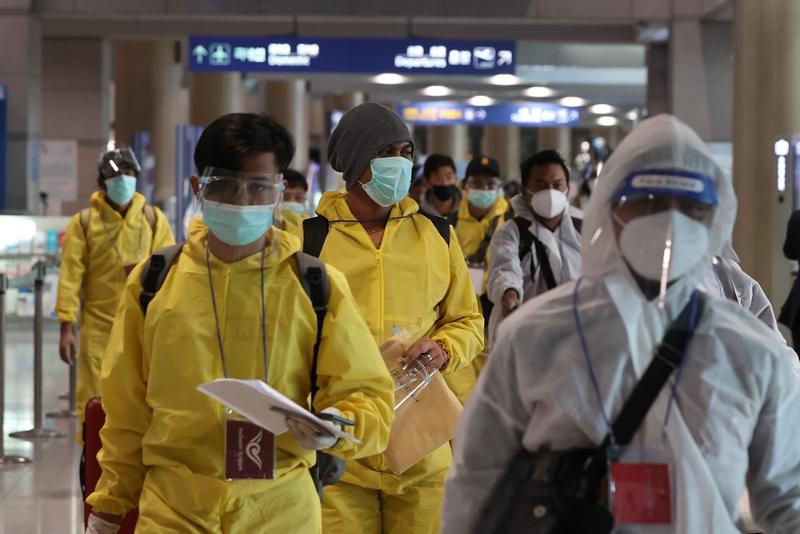
Foreign passengers wearing personal protective equipment on Nov. 29 arrive at Incheon International Airport. (Yonhap News)
By Jung Joo-ri and Lee Jihae
The government has banned the entry of foreign arrivals from eight African countries to prevent the spread of the Omicron variant of COVID-19.
This is the second time since the pandemic broke out that the government has prohibited the entry of foreign arrivals, following the first in February last year, when foreign arrivals from China's Hubei Province were not allowed into the country.
The Central Disease Control Headquarters on Nov. 27 in an emergency meeting decided as of midnight on Nov. 28 to ban foreign arrivals from the following nations where the Omicron variant broke out and their neighboring countries: South Africa, Botswana, Zimbabwe, Namibia, Lesotho, Eswatini (Swaziland), Mozambique and Malawi.
The eight were designated countries with tighter restrictions, high risk and not included on Korea's list of quarantine-exempt states.
Visa issuance is restricted for people arriving from countries with tighter restrictions. Koreans coming in from high-risk countries must self-isolate in temporary facilities upon arrival in Korea, and those from countries not included on the list of quarantine exemption do the same even if fully vaccinated.
Foreign nationals who had stopovers in any of the eight countries must have their passports checked in the check-in process in Korea and are banned from boarding a plane or entering the country. Korean nationals can enter the country after submitting a negative result from a polymerase chain reaction test and self-isolating for ten days at a temporary living facility in Korea regardless of vaccination status. They will be tested for COVID-19 on their first and fifth day of isolation and right before the end of their quarantine.
The headquarters on Nov. 28 confirmed that the Omicron cases detected in Hong Kong, the U.K. and Italy originated in African countries such as South Africa and Mozambique. "Through continuous monitoring of the mutated Omicron variant, we plan to review expanding or modifying the list of target countries with higher restrictions by identifying the degree of risk and spread," it added.
The World Health Organization on Nov. 26 named the new B.1.1.529 variant of COVID-19 "Omicron," which spread after first being reported in South Africa, after the 15th letter of the Greek alphabet. The global health body called Omicron "a variant of concern."
etoilejr@korea.kr